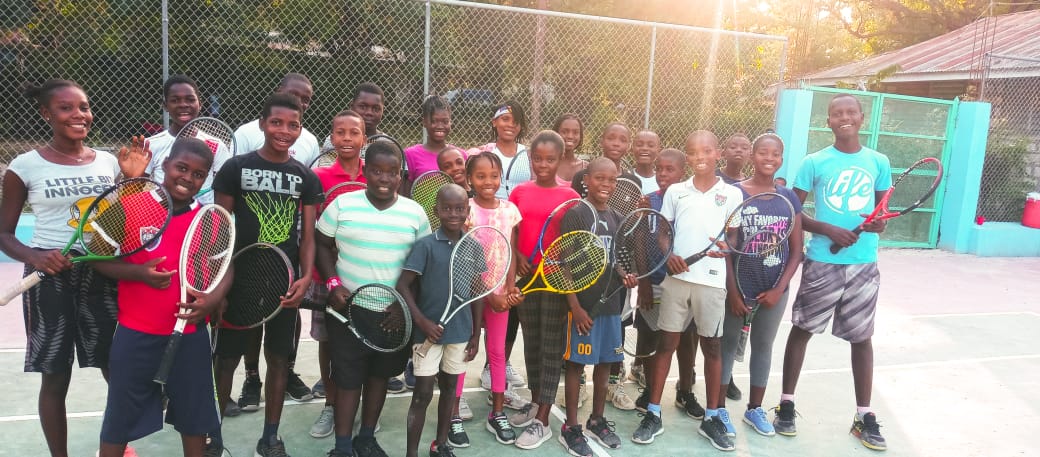The Cross Cultural Exchange program is an opportunity for elementary school age children from Essex, Ct and Deschapelles, Haiti to share experiences and learn from one another. To learn about the program, please scroll down to “Cross Cultural Exchange.” To learn the latest, read on to the “Status Report”.
Cross Cultural Exchange: Update: Summer 2015
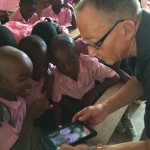
What is life like for children in Essex CT? And what is life like for children in Deschapelles Haiti? How can children learn from each other about their similarities and differences?
It was important to have given the directors of the schools the experience in using the tablets to video. They understood the purpose of the exchange and in learning about it had fun themselves.
Building on their “learning” about each other, the Essex students were successful in their ability to adapt to ways of conveying information about their school with a minimum of words. Their videos of activities were shared with the schools in Haiti. The two photographers helped the first school devise a plan of how to respond. They followed the guide of what one puts in a back pack, a geometry lesson exercise done on a blackboard, one child speaking about himself and school and then recess or as they call it “recreation” The children, both in Essex and Deschapelles learned that it was important to enunciate and project their voices. The video link below, was created by Andrew Snyder, using selected clips of the different activities from both exchanges. The growth in understanding of both groups on how to better convey information is quite evident. The ODES facilitators for the project did not ask for the most talented children to do the videos (which is often what happens in Haiti) but rather asked for volunteers for the different tasks.
It takes more time than one might think to make this actually happen: carrying tablets with videos in travelers’ luggage; sharing with the different classes; recording in the ambient noise atmosphere of schools in Haiti; and then returning the new videos from Haiti back to Essex. But it was well worth the effort as the children in Haiti and Essex now know a bit more about their simllarities and differences in their school lives, and they became creative in adapting to a format that was more successful. In the fall of 2015 the 6th graders in Essex and Deschapelles will share information about different foods that are locally available and how they are purchased.
Cross Cultural Exchange

Sixth graders in Essex Elementary School initiated a cross cultural exchange between their classes and sixth graders in schools in Deschapelles using tablets with video capabilities which were funded by the Essex Elementary School Foundation.
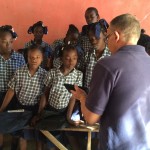
The original concept was to have individual students in Essex create relationships with individual students in Deschapelles. That worked fine in Essex where the classes are quiet! We brought the tablets to Deschapelles in January 2014to share the messages with the schools there. It was quickly evident that, although the students were so excited to see the videos and get their messages from EES students, it was very difficult to actually hear the messages and to video individual students because the classrooms, as these photos show, are all right next to each other with many openings for ventilation. Much of the work is oral repetition, which increases the ambient noise. Roosters and barking dogs add to the cacaphonic symphony.
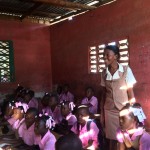
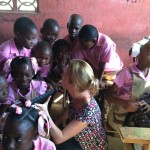
Dan Taylor Stypa, Board member, and Hope Proctor, our volunteer architect and parent of a child participating in this exchange, visited the Deschapelles schools, along with two of our Haitian team, to visit the schools. They soon realized that the system that works in Essex does not necessarily work in Haiti. They adapted their videos somewhat to reflect more of the traditional learning processes – replying to a question all together orally – such as “Where do you live? What is the name of your school?” Translating so many of the videos from English to Kreyol and back again was challenging and incredibly time consuming. Although we did not have time to translate all the Kreyol and French messages, the students learned a great deal about schools and children in Haiti by looking at the videos: Deschapelles students wear uniforms; their clothing is always crisply ironed; the girls’ hair is always well groomed and usually embellished with ribbons to match their uniforms; their lessons are written on the blackboard; the desks are rudimentary; the buildings and classrooms are rustic; the children are alert and very interested in viewing and creating videos; and smiles are always abundant.
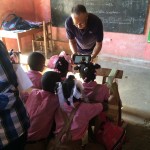
After seeing the videos from Haiti, the children in Essex realized that there were other ways to share information about themselves and their schools. They decided to show different aspects of their school by videoing recess, physical education, music, art etc. The students looked up the French or Kreyol words for what they were taping, wrote them in large print on cards, videoed them, and let the video speak for itself. We now are able to exchange the videos back and forth through the internet making it possible to keep the conversations going without having to wait for a traveler carry the tablets back and forth. The exchange will continue when schools resume in the fall of 2014. I suspect the children in Essex and Haiti will continue to create new ways to exchange information about themselves and their cultures.


